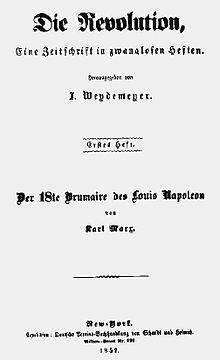- The Eighteenth Brumaire of Louis Napoleon
-
Der 18te Brumaire des Louis Napoleon (in English, The Eighteenth Brumaire of Louis Napoleon) was written by Karl Marx between December 1851 and March 1852, and originally published in 1852 in Die Revolution, a German-language monthly magazine published in New York and established by Joseph Weydemeyer. Later English editions (such as an 1869 Hamburg edition) were entitled The Eighteenth Brumaire of Louis Bonaparte.
The pamphlet shows Marx in his form as a social and political historian, treating actual historical events—those leading up to Louis Bonaparte's coup d'état of 2 December 1851—from the viewpoint of his materialist conception of history. Together with Marx's contemporary writings on English politics, the Eighteenth Brumaire is the principal source for our understanding of Marx's theory of the capitalist state.[1]
The "Eighteenth Brumaire" refers to November 9, 1799 in the French Revolutionary Calendar—the day Louis Bonaparte's uncle Napoleon Bonaparte had made himself dictator by a coup d'état.
Contents
Contents of the book
In the preface to the second edition, Marx said it was the intention of the work to "demonstrate how the class struggle in France created circumstances and relationships that made it possible for a grotesque mediocrity to play a hero's part."[2]
The work contains the most famous formulation of Marx's view of the role of the individual in history: "Men make their own history, but they do not make it as they please; they do not make it under self-selected circumstances, but under circumstances existing already, given and transmitted from the past."
Marx's interpretation of Louis Bonaparte's rise and rule is of interest to later scholars studying the nature and meaning of fascism. Many Marxist scholars regard the coup as a forerunner of the phenomenon of 20th century fascism.[3]
"History repeats ... as tragedy, then as farce"
This book is the source of one of Marx's most quoted[4] statements, that history repeats itself, "the first as tragedy, then as farce", referring respectively to Napoleon I and to his nephew Louis Napoleon (Napoleon III):
Hegel remarks somewhere that all great world-historic facts and personages appear, so to speak, twice. He forgot to add: the first time as tragedy, the second time as farce. Caussidière for Danton, Louis Blanc for Robespierre, the Montagne of 1848 to 1851 for the Montagne of 1793 to 1795, the nephew for the uncle. And the same caricature occurs in the circumstances of the second edition of the Eighteenth Brumaire.[5]
Marx's sentiment echoed an observation made by Friedrich Engels at exactly the same time Marx began work on this book. In a letter to Marx of 3 December 1851, Engels wrote from Manchester:
.... it really seems as though old Hegel, in the guise of the World Spirit, were directing history from the grave and, with the greatest conscientiousness, causing everything to be re-enacted twice over, once as grand tragedy and the second time as rotten farce, Caussidière for Danton, L. Blanc for Robespierre, Barthélemy for Saint-Just, Flocon for Carnot, and the moon-calf together with the first available dozen debt-encumbered lieutenants for the little corporal and his band of marshals. Thus the 18th Brumaire would already be upon us.[6]
Yet this motif appeared even earlier, in Marx's 1837 unpublished novel Scorpion and Felix, this time with a comparison between the first Napoleon and King Louis Philippe:
Every giant ... presupposes a dwarf, every genius a hidebound philistine.... The first are too great for this world, and so they are thrown out. But the latter strike root in it and remain.... Caesar the hero leaves behind him the play-acting Octavianus, Emperor Napoleon the bourgeois king Louis Philippe....[7]
See also
- Karl Marx
- Marxism
- Marxist theory
- Marxist philosophy
- Historical materialism
External links
- The Eighteenth Brumaire of Louis Napoleon (Chapters 1 & 7 translated by Saul K. Padover from the German edition of 1869; Chapters 2 through 6 are based on the third edition, prepared by Friedrich Engels (1885), as translated and published by Progress Publishers, Moscow, 1937.)
- Preface to the Second Edition (1869)
- The eighteenth Brumaire of Louis Bonaparte, Charles H. Kerr, Chicago, 1907.
- The Eighteenth Brumaire Of Louis Bonaparte, International Publishers, New York, 1963.
Notes
- ^ Jon Elster, An Introduction to Karl Marx, Cambridge, England, 1990 (first pub. 1986), p 8.
- ^ "The Eighteenth Brumaire of Louis Napoleon". http://www.marx2mao.com/M&E/EBLB52.html. Retrieved 2009-06-03.
- ^ Tucker, R.C. "The Marx-Engels Reader, 2nd ed.," page 594. New York: Norton, 1978.
- ^ "The Dreyfusian Revolution by George Sorel 1908". http://www.marxists.org/archive/sorel/1908/dreyfus-revolution.htm. Retrieved 2009-06-03.
- ^ Karl Marx. The Eighteenth Brumaire of Louis Bonaparte. http://www.marxists.org/archive/marx/works/1852/18th-brumaire/ch01.htm.
- ^ Marx/Engels Collected Works. International Publishers. http://www.marxists.org/archive/marx/works/1851/letters/51_12_03.htm#cite.
- ^ Quoted in Francis Wheen (July 2001). Karl Marx: A Life. W. W. Norton & Company. ISBN 9780393321579. http://books.google.com/books?id=3KOyuSakn80C&pg=PA25. Retrieved 8 March 2011., pages 25-26. Wheen points out the similarity between this passage and the one in Eighteenth Brumaire, but his quotation of the latter is a different translation or version than the one which appears above, or is perhaps a garbled combination of the Marx and Engels passages.
The works of Karl Marx and Friedrich Engels Marx Scorpion and Felix (1837), Critique of Hegel's Philosophy of Right (1843), On the Jewish Question (1843), Notes on James Mill (1844), Economic and Philosophical Manuscripts of 1844 (1844), Theses on Feuerbach (1845), The Poverty of Philosophy (1847), Wage-Labor and Capital (1847), The Class Struggles in France, 1848–1850 (1850), The Eighteenth Brumaire of Louis Napoleon (1852), Grundrisse (1857), Preface to A Contribution to the Critique of Political Economy (1859), Theories of Surplus Value, 3 volumes (1862), Value, Price and Profit (1865), Capital, Volume I (Das Kapital) (1867), The Civil War in France (1871), Critique of the Gotha Program (1875), Notes on Wagner (1880), Mathematical manuscripts of Karl Marx (1968)Marx and Engels The German Ideology (1845), The Holy Family (1845), Manifesto of the Communist Party (1848), Writings on the U.S. Civil War (1861), Capital, Volume II [posthumous to Marx, published by Engels] (1885), Capital, Volume III [posthumous to Marx, published by Engels] (1894)Engels The Condition of the Working Class in England in 1844 (1844), The Peasant War in Germany (1850), Revolution and Counter-Revolution in Germany (1852), Anti-Dühring (1878), Socialism: Utopian and Scientific (1880), Dialectics of Nature (1883), The Origin of the Family, Private Property, and the State (1884), Ludwig Feuerbach and the End of Classical German Philosophy (1886)Categories:- 1869 books
- History books about France
- Communist books
- Books by Karl Marx
- 19th-century history books
Wikimedia Foundation. 2010.


